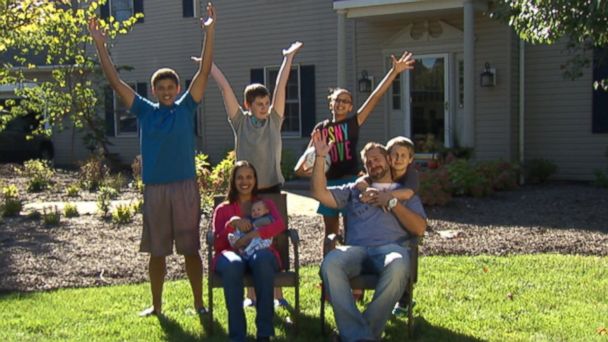Parenting Tips to Stop the Yelling and Better Discipline Kids
The Johnson-Tuggey clan in Cleveland say they don't curse or use putdowns when it comes to discipline but could use a little help in the not-yelling department.
With their blended family that includes Jackson, 12; Devin, 12; Charlie and Gabriella, both 10; and 1-month-old Leo, parents Sarah Johnson and Jon Tuggey said parenting at times was "crazy."
"I yell so I'm heard but I'm not yelling at them and I'm not trying to hurt their feelings and make them feel beneath me," Jon Tuggey said.
But a study released in September in the journal Child Development says harsh verbal discipline can be devastating to young teenagers. And it doesn't take much. Even in otherwise loving homes, yelling, cursing or insults can have many of the same effects as hitting and can lead to depression, anxiety and low self-esteem.
Researchers from the University of Pittsburgh and the University of Michigan looked at almost 1,000, mostly middle class, two-parent families. The parents answered surveys designed to measure how often they engaged in shouting, swearing, or name-calling with their kids. Their children took a different survey that asked how often they felt worthless or had other feelings related to depressive symptoms. The survey also asked them how often they lied, stole, damaged public property, or disobeyed in school.
Not only did harsh verbal discipline not work to change teens' behavior; it also appeared linked to increased depressive symptoms and bad behaviors.
"What this study is showing [is] that the more you do harsh discipline, which might be yelling at your child, it might be cursing, it might be calling them names, the more you do that, the worse it is for your child," said Dr. Carolyn Ievers-Landis, a child psychologist at UH Rainbow Babies and Children's Hospital in Cleveland.
"The problem with yelling is that around the time that your child is a teenager, from young into older teenager, they are really trying to establish their identity," she said. "When you are yelling at them, screaming at them, cursing or calling them names … they start to internalize some of these things and in some cases these come out in depression and mood problems."
Sarah and Jon's son Devin, 12, said that sometimes when he got yelled at, he'd get angry or feel sad.
"I think it would make a difference if they weren't yelling," he said. "I don't think I would feel these mixed emotions."
"I just wish I could get talked to," said Jackson Tuggey, 12. "Not necessarily yelled at."
Ievers-Landis said one strategy parents could use is giving themselves a timeout and having the other parent, who has not been pushed to the limit, step in with the child. She also suggested using more carrot and less stick.
"Try to motivate your child to do what you want them to do by setting up systems where they will earn privileges by behavior that you like," she said.
Other advice from Ievers-Landis: Talk to your child and listen. Don't be afraid to apologize. Parenting experts say that teaches kids that parents make mistakes too.
Ievers-Landis, also a mother of a 12-year-old and a 14-year-old, said it was very important for parents to cease the yelling.
"You really have a very important role as a parent to build up your child and identify their strengths as opposed to tearing them down and saying things that will hurt them when they are trying to find their identity," she said. "We have to look at ourselves and see how we come off to our kids."
ABC News' Cynthia McFadden, Catherine Cole and Kim Brooks contributed to this article.

ABC News